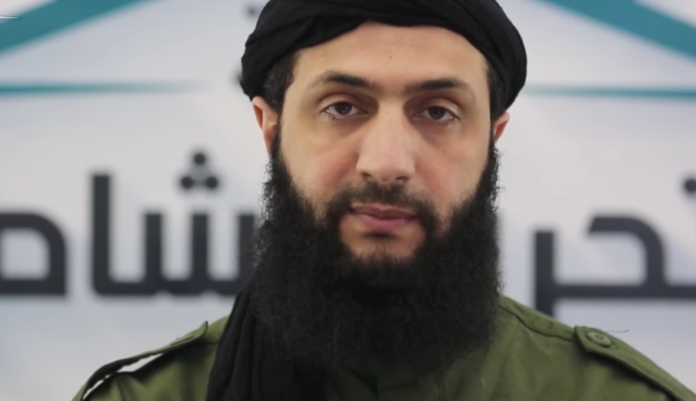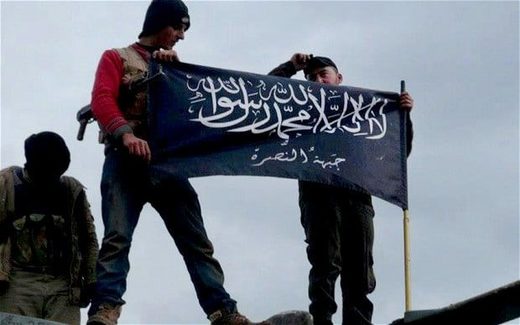
"Are we supporting al Qaeda in Syria?"
Among Syria commentators in the West, both left and mainstream, it is commonly claimed that the Syrian government led by Bashar al-Assad has attempted to crush the supposedly moderate, secular rebels of the Western-backed Free Syrian Army (FSA), while at the same time deliberately supporting extremist rebel groups in order to "
Islamize" the Syrian rebellion and to convince the West the Syrian government is really fighting terrorism. It is argued that if Assad could claim his government was fighting al-Qaeda terrorists, rather than secular freedom fighters struggling for democracy, this would force the US and other Western powers to end their support for the Syrian rebels trying to topple the Syrian government, and to instead embrace Assad as a partner with the West in the so-called War on Terror.
A closer review of events in Syria shows the opposite, however, namely that
it is the US-backed FSA-branded Syrian rebel groups that have consistently collaborated with and fought alongside al-Qaeda's Syrian affiliate, the Nusra Front, as well as alongside other Salafi-Jihadi rebel groups, namely
Ahrar al-Sham and
Jaish al-Islam, and at times even alongside the Islamic State (ISIS).

Jabhat al-Nusra
Nusra and FSA-affiliated brigades have essentially functioned as a coalition in the fight against the Syrian government, with FSA commanders often
referring to fighters from Nusra as members of the FSA itself. In many cases, FSA offensives against Syrian government military bases or check points have
begun with suicide or truck bombings carried out by Nusra militants. Nusra and FSA-affiliated brigades have established joint
committees to divide weapons captured from the Syrian army in rebel offensives. FSA commanders often
sell US and Gulf-supplied weapons to Nusra.
Certain FSA brigades and Nusra have of coursed clashed at times, however, there is a clear pattern of FSA collaboration with Nusra generally. FSA and Nusra militants have fought side by side in key battles in which the Syrian opposition has been able to capture large population centers and territory from the Syrian government. FSA and Nusra rebels, often hailing from the Syrian countryside or from outside of Syria itself, invaded many of Syria's major cities, causing large numbers of civilians to flee to other Syrian government controlled areas, or to neighboring countries as refugees, as occurred in
Aleppo,
Raqqa, and the
Yarmouk Palestinian refugee camp in the Damascus suburbs. The majority (77%) of Syrian refugees in Europe
reported fleeing violence from both the Syrian government
and the rebels, suggesting that Syrians feared both the rebel invasions of their cities, and the harsh Syrian government response which inevitably followed.
Residents who remained in their homes were then forced to live under jihadist occupation, as FSA brigades and Nusra continued to coexist and jointly control Syrian territory for months or even years, as was the case in Aleppo, Raqqa, Deir Ezzur, Idlib, and Yarmouk camp. This means that when the Syrian army was fighting to recapture cities and territory from the FSA, it was typically also fighting Nusra.
In some opposition controlled areas, joint Nusra-FSA control was a precursor to Islamic State (ISIS) control. It must be remembered that ISIS leader Abu Bakr al-Baghdadi founded Nusra by sending a delegation of fighters from Iraq to Syria in late 2011.
Nusra and ISIS were essentially the same organization. After FSA and Nusra rebels captured Deir Ezzur in the spring of 2013, a
dispute over control of newly captured Syrian oil fields caused Nusra to split from ISIS. Nusra fighters therefore had to choose whether to remain loyal to Nusra, or to pledge loyalty to Baghdadi and join ISIS. When many Nusra fighters did
choose to join ISIS, the group gained immediate influence in areas previously captured by Nusra and the FSA, in particular in Raqqa and Deir Ezzur. ISIS, Nusra, and FSA brigades at first co-existed in these areas, however, ISIS was able to oust the FSA and what remained of Nusra from Raqqa and Deir Ezzur entirely within the next year. This allowed ISIS to
capture Syria's most lucrative oil fields, establish Raqqa as its Syrian capital, and greatly grow the size and strength of its so-called Caliphate.
Cooperation between ISIS and Nusra actually continued in some areas, so that in 2015, Nusra fighters deliberately helped
facilitate an ISIS takeover of the Yarmouk refugee camp after Nusra had jointly occupied the camp alongside its FSA counterparts for three years. In the Yarmouk basin in southwest Deraa province, near the Israeli border, a prominent FSA brigade
declared loyalty to ISIS in late 2014, bringing additional opposition-held territory under ISIS control.
This means that ISIS gained its foothold in many areas as a result of the FSA and Nusra first capturing those areas from the Syrian government.In a lengthy study analyzing Nusra strategy, Jennifer Cafarella of the
Institute for the Study of War (ISW)
concluded that "JN [Jabhat al-Nusra] serves as a force multiplier for other rebel groups. JN leverages small units of highly skilled fighters to contribute an essential special forces-like capability to rebel military offensives. JN provides highly effective capabilities such as the deployment of suicide bombers to produce asymmetric effects against the regime."
Such FSA/Nusra cooperation is not surprising given Nusra's goal of embedding itself within the broader US-backed Syrian insurgency. Nusra leader Abu Mohammad al-Jolani highlighted this approach,
stating to
al-Jazeera that "Preserving good relations with the other groups and treating them well and turning a blind eye to their mistakes is the foundation in dealing with the other groups."
Nusra support for the FSA is generally downplayed by rebels themselves for public relations reasons. For example, an opposition activist in Deraa
described how "The FSA and Al Nusra join together for operations but they have an agreement to let the FSA lead for public reasons. . . Operations that were really carried out by Al Nusra are publicly presented by the FSA as their own." Similarly, the Western media often describe joint Nusra/FSA operations in vague terms, such as "rebel offensives" and describe Nusra/FSA controlled territory as "opposition-held," making it difficult to observe the symbiotic relationship between the two groups when casually reading the news of events in Syria.
FSA dependence on Nusra was made clear when US officials designated Nusra as a terrorist organization in late 2012. FSA commanders protested the decision,
insisting that
"We are all Nusra."At first glance, it might appear that US officials were alarmed by cooperation between Nusra and the FSA, given that Nusra is al-Qaeda's affiliate in Syria. However, there is considerable evidence that
US planners have themselves viewed Nusra as an ally in its effort to overthrow the Assad government, despite designating it a terrorist organization. US planners have bombed Nusra only sparingly, as Nusra's efforts to topple the Syrian government dovetailed with the United States' own. When US planners did bomb Nusra targets in an effort to kill specific al-Qaeda militants suspected of planning attacks against the West, US officials took great pains to
emphasize they were not bombing Nusra, which they viewed as helping Syrians fight against Assad but rather elements of al-Qaeda they considered to belong to a separate and previously unknown entity, the Khorasan group. US planners also expected that US-trained rebels would be welcomed by Nusra in the battle against the Syrian government, and expressed
shock when Nusra attacked these US-trained groups and stole their weapons in several instances.
In November 2016, some officials in the Obama administration acknowledged the tacit alliance with Nusra and argued for a shift in US policy. The
Washington Post reports that "Officials who supported the shift said the Obama administration could no longer tolerate what one of them described as 'a deal with the devil,' whereby the United States largely held its fire against al-Nusra because the group was popular with Syrians in rebel-controlled areas and furthered the U.S. goal of putting military pressure on Assad."
Further, one must not rely on claims from Assad, or Syrian, Russian, and Iranian state media to conclude that it is the US-backed FSA that collaborates with al-Qaeda. Rather this is clear from admissions from FSA commanders themselves, and from reporting in Western and Gulf media outlets (broadly hostile to the Syrian government) about specific rebel offensives.In the remainder of this essay, I will provide a brief overview of the events showing collaboration between the FSA and Nusra in each of the areas mentioned above, as well as evidence suggesting that US planners have typically viewed Nusra (and even ISIS in specific circumstances) as an ally in its covert fight against the Syrian government.
Read the rest of the article here.
Reader Comments
to our Newsletter